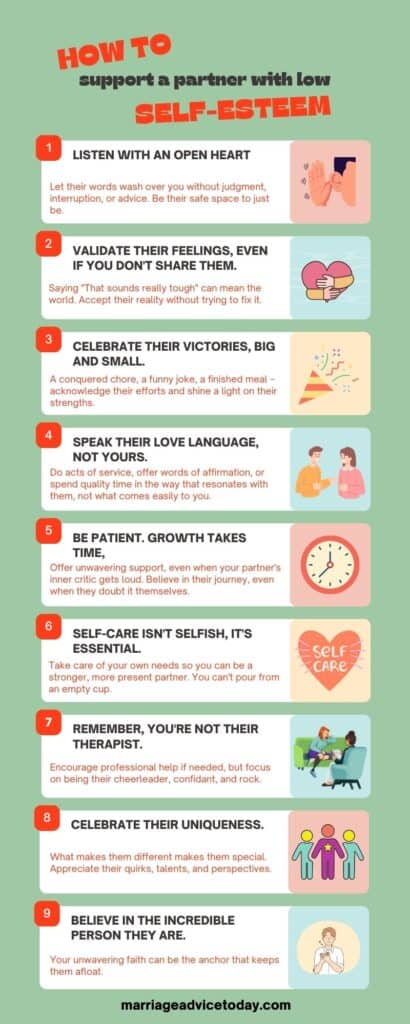Boosting Your Partner’s Self-Esteem: A Guide to Providing Support and Encouragement
In a world where self-doubt and insecurities can sometimes weigh us down, one of the most beautiful acts we can do for our partners is to lift them up. Boosting your partner’s self-esteem is not only a sign of love but also a powerful way to strengthen your marriage. However, providing the right kind of support and encouragement isn’t always as straightforward as it may seem.
In this comprehensive guide, we will explore effective strategies to help build your partner’s self-esteem and foster a positive mindset. From understanding the root causes of low self-esteem to learning how to effectively communicate and offer encouragement, we share the essential tools and techniques to uplift your loved one.
Through insightful tips and practical advice, you will discover how to be their biggest cheerleader and create a nurturing environment that encourages self-worth and confidence. Remember, boosting your partner’s self-esteem is not about fixing them; it’s about demonstrating your belief in their inherent value and supporting them along their journey of self-discovery. By investing in their well-being, you can cultivate a deep connection built on trust, love, and empowerment.
We’re talking about real-life tips like:
- Becoming a compliment ninja: Forget generic “you look nice.” Let’s celebrate their quirks, their talents, the way they make you laugh until you snort milk. Show them their worth shines beyond just appearances.
- Communication magic: Sometimes insecurities make people clam up like a treasure chest. Learn their nonverbal cues, create safe spaces to talk, and remind them you’re always there to listen, judgement-free.
- The jealousy tamer: It’s normal to feel a pang when your partner gets a compliment, but let’s turn that green monster into a cheerleader. Celebrate their successes, build each other up, and remember, a confident partner means a stronger relationship for both of you.
- Intimacy, the shy butterfly: Low self-esteem can make physical affection feel like crossing a minefield. Be patient, create a safe space for them to feel comfortable, and let them know you love them for who they are, body and soul.
Dive in and make a positive difference in your partner’s life.
Table of Contents

This post contains affiliate links which may earn me commissions should you click through them and take certain actions. As an Amazon Associate I earn from qualifying purchases.
Understanding Self-Esteem and it’s Importance in Relationships
Supporting a partner with low self-esteem requires more than just a shoulder to cry on. It demands a deeper understanding of this complex psychological concept. Self-esteem isn’t just about feeling good about yourself or having superficial confidence. It’s about your internal compass, your intrinsic sense of worth and respect. It encompasses believing in your capabilities (self-efficacy), treating yourself with kindness (self-compassion), and finding validation from within, independent of external approval.
Signs of low self esteem:
- Excessive self-criticism: Constantly finding fault with oneself, even for minor mistakes.
- Negative self-talk: Ruminating on negative thoughts about oneself, abilities, and appearance.
- Difficulty accepting compliments: Dismissing praise or feeling undeserving of positive words.
- Fear of failure: Avoiding challenges or new experiences due to the fear of making mistakes.
- Social anxiety: Feeling insecure or uncomfortable in social situations, fearing rejection or judgment.
- Difficulty making decisions: Feeling paralyzed by indecision due to lack of confidence in choices.
- Envy and comparison: Constantly comparing oneself to others and feeling inferior.
- Hopelessness and helplessness: Believing that things will never improve and feeling powerless to change.
- People-pleasing: Overaccommodating to others’ needs to avoid disapproval.
- Self-sabotage: Engaging in behaviors that undermine personal goals or success.
- Isolation and withdrawal: Avoiding social interaction or withdrawing from relationships.
- Neglecting self-care: Ignoring physical and emotional needs due to low self-worth.
- Perfectionism: Holding unrealistic standards for oneself and becoming overwhelmed by the need for flawlessness.
- Self-destructive behaviors: Engaging in harmful activities (e.g., substance abuse) as a coping mechanism.
- Difficulty expressing or asking for needs: Fearing being perceived as needy or unwelcome.
Contrary to popular belief, self-esteem isn’t a constant state or solely tied to appearance. It fluctuates across different domains of life. You might have high confidence in your creative abilities but struggle with social situations. This understanding is key, as different insecurities require different approaches when offering support.
By exploring these intricacies more deeply, you equip yourself to tailor your support to your partner’s specific needs. Knowing what fuels their low self-esteem empowers you to provide targeted encouragement, celebrate their unique strengths, and gently challenge limiting beliefs.
The Impact of Low-Self Esteem on Relationships
Low self-esteem can have a profound impact on relationships, often leading to communication difficulties, conflicts, and emotional distance. When your partner doubts their own worth, they may struggle to believe in the love and support you offer them. This can create a cycle of seeking external validation and feeling insecure, leading to a constant need for reassurance.
In addition, low self-esteem may cause your partner to feel unworthy of your love, leading them to push you away or sabotage the relationship. They may fear intimacy or believe they are not deserving of a healthy and loving partnership. It’s crucial to understand that their behavior is not a reflection of your love or commitment but rather a manifestation of their own insecurities.
Furthermore, low self-esteem can hinder effective communication and problem-solving within the relationship. Your partner may have difficulty expressing their needs and boundaries, fearing rejection or judgment. This can create misunderstandings and resentment, further exacerbating the strain on the relationship. By addressing and supporting your partner’s self-esteem, you can create a more open and trusting environment for both of you.

How to Support a Partner with Low Self Esteem
It’s a familiar scene for many: the whispers of doubt, the lingering sense of inadequacy, the shadow that dims even the brightest moments. You might recognize these feelings in yourself, or perhaps you see them in your partner. They’re struggling, and you’re there, wanting to help but unsure where to begin.
This guide is for both of you.
For those wrestling with self-doubt, and for the partners eager to offer support but feeling lost in the process.
We’re here to offer practical steps to navigate these challenges together. We’ll explore strategies for fostering understanding and mutual support, paving the way towards a journey of self-acceptance and love.
The road ahead isn’t without its hurdles. There will be moments of frustration and setbacks. But it’s crucial to remember: you’re in this together. As a team, you can reshape this story, transforming those whispers of doubt into affirmations of self-worth, and looking towards a future where confidence outshines all uncertainties.
1. Acknowledge Past Influences
Often, the seeds of low self-esteem are sown by past experiences. It might be a childhood marked by bullying, family turmoil, or academic struggles. Perhaps it’s a more recent event, like a tough break-up or career hiccup. Recognizing these influences can shed light on current feelings and behaviors.
Consider these potential sources of self-esteem issues:
Childhood Experiences: Facing bullying, neglect, abuse, family conflicts, academic challenges, or a dearth of positive role models.
Relationship Dynamics: Enduring toxic relationships, experiences of betrayal, rejection, or social isolation.
Professional and Personal Setbacks: Dealing with job loss, financial strains, or disappointments in academic or career ambitions.
Body Image Concerns: Grappling with unrealistic beauty standards, body shaming, or the impacts of chronic health issues.
Trauma and Mental Health: Experiencing abuse, violence, ongoing stress, anxiety, depression.
Discrimination: Confronting racism, sexism, homophobia, or other forms of societal injustice.
Understanding these factors is a vital step in the journey towards healing and self-compassion.
2. Engage in Meaningful Conversations
It’s pivotal when your partner decides to share their inner world—thoughts and feelings—to be all in. Lock eyes, lend them your ears without butting in, showing you’re really soaking in every word. Get into their emotional shoes by asking questions to grasp their perspective, but hold off on dishing out advice or fixes right away. Just being there, tuned in and empathetic, speaks volumes.
Top Tips for Heart-to-Heart Talks:
Set a Cozy Scene: Make sure your other half feels totally comfy spilling their heart out, no fear of being judged or critiqued.
Ace Active Listening: Zero in on their words, keep eye contact steady, and don’t interrupt their flow.
Boost Understanding: Pop questions that show you’re not just hearing, but really getting what they’re saying.
Acknowledge Their Feelings: Understand and respect their emotions, even if you’re not on the same page.
Offer a Confidence Boost: Gently remind them of the cool stuff about them, their strengths and wins.
Keep the Convo Rolling: Let them lead the talk and steer away from giving advice they didn’t ask for.
Respect Their Space: Be mindful of what they’re comfy talking about and don’t nudge them into zones they’re not ready for.
Celebrate the Chat: Give props to their openness and willingness to share.
Always remember, building a nurturing and steady chat space is key to keeping your relationship in great shape.
3. Consider Therapy
Navigating the maze of low self-esteem can be tough, and it’s totally okay to reach out for professional guidance. Therapy can be a lifesaver, offering a space to dig into past experiences, unravel those pesky negative thoughts, and pick up strategies to deal with them. If you and your partner are hitting a wall, why not give online resources a whirl or chat with a therapist to see if it clicks for you?
Perks of Therapy for Self-Worth in Relationships:
- Digging Deep: Get to the heart of what’s been nudging your self-esteem down, be it past events or sneaky thought patterns.
- Toolkit for Tough Times: Pick up ways to tackle those downer emotions and self-doubt.
- Flip the Negative Script: Transform those twisty thinking patterns into something more positive and healthy.
- Embrace Self-Love: Work on being kinder and more accepting of yourself, which can really pump up your self-worth.
- Goal Getter: Set realistic goals and celebrate each step forward, boosting your confidence bit by bit.
- Talk it Out: Learn how to communicate in a way that’s clear, open, and great for your relationship.
- Stress-Busting Skills: Develop the strength and know-how to handle life’s curveballs.
- Celebrate You: Discover and cheer on your own unique talents and abilities.
Opting for therapy can be a game-changer in how you see yourself and interact in your relationship.
4. Show Unconditional Love
Love’s a unique experience for everyone. Dive into understanding your partner’s love language—whether it’s acts of service, sweet words, quality time, and so on. Tailor your gestures to touch their heart. Maybe it’s penning a sincere note, sharing an activity they adore, or lending a hand with day-to-day tasks. When you go that extra mile to get their love language right, it shows your love is more than just talk.
Ways to Show Your Partner You Care:
- Acts of Service: Tackle the chores, whip up their favorite dish, take care of errands, or give a soothing massage.
- Words of Affirmation: Scatter love notes, pen heartfelt letters, dish out honest compliments, cheer on their successes.
- Quality Time: Give them your full attention, join in on activities they love, listen intently without any distractions.
- Gifts: Pick presents that show you get them, maybe something handmade, or plan fun experiences like concerts or little adventures.
- Physical Touch: Share warm, non-romantic touches like hugs, hand-holding, snuggling, or a comforting pat on the back.
The idea of love languages is just a starting point. What’s crucial is expressing your affection in ways that truly connect with your partner and make them feel deeply valued.
5. Speak Your Affections
Let’s face it, dropping an “I love you” is mighty, but sometimes it needs a little jazzing up. Sharing how much you treasure your partner with words that cut deeper than the usual can really lift their spirits.
Here’s how to express your love in ways that hit home:
- Zoom in on the Details: Skip the general praise and go for what you truly cherish about them. Saying “I love how your laughter turns my worst days around” feels more personal than just “you’re funny.”
- Cheer on Their Strengths: Shine a light on what makes them special. “Your imagination blows me away” or “you’ve got a knack for solving anything” celebrates their unique gifts.
- Shower Them with Thanks: Acknowledge the difference they make in your life. “I’m so grateful for your unwavering support” or “coming home to you is the best part of my day” lets them know they’re valued.
- Craft Custom Compliments: Align your words with their insecurities. “You’re stronger than you realize” or “you’re worthy of all the joy” can help silence their self-doubt.
- Notice the Little Things: Casual compliments like “that shirt looks amazing on you” or “your cooking skills are out of this world” add a touch of warmth and show you’re attentive.
Extra Hint: Put it in writing! Sneak love notes, pen a touching letter, or make a playlist of songs that echo your feelings.
Examples:
- “The way you stick to your goals inspires me daily. You chase your dreams with such passion, and it pushes me to follow mine.”
- “I feel so secure and loved with you. Your kindness and strength are my pillars.”
- “Remember how you helped me through my fear of public speaking? You’re not just my love, you’re my hero.”
- “Your sense of humor and positivity light up even our toughest days. You’re the ray of sunshine in my life.”
- “Your compassionate heart is something rare. The way you care for others makes me want to be the best version of myself.”
Remember, expressing your love doesn’t need to be a grand affair. It’s about being genuine and considerate with your words, starting small and being consistent. Watch as it nurtures their self-esteem and strengthens your bond.
6. Be Patient
Helping a partner with low self-esteem is more of a long-distance journey than a quick race. Expect days when their self-doubt peaks, progress seems to stall, and impatience might bubble up. Embrace patience as a precious gift you offer both to them and to yourself.
Scenarios Where Patience is Crucial:
- Dealing with Setbacks: Remember, improvement isn’t a straight path. When old insecurities resurface, show steadfast support rather than expressing disappointment.
- Acknowledging Slow Progress: Self-esteem builds gradually. Applaud the small wins and resist the urge to hurry their growth.
- Handling Self-Sabotage: At times, low self-esteem may lead to rash choices or negative patterns. Remain composed, show empathy, and gently steer them towards positive coping strategies.
- Overcoming Communication Hurdles: In moments of low confidence, articulating feelings can be tough. Engage in active listening, foster a non-judgmental environment, and don’t misinterpret their quiet moments as indifference.
- Encouraging Self-Care: Diminished self-worth might result in neglecting personal needs. Promote healthy habits gently, steer clear of criticism, and lead by example in your self-care routine.
The Importance of Patience for Your Partner:
- Creates a Safe Haven: Showing consistent support through the good and bad days builds a secure environment for healing and growth.
- Reduces Pressure: Demonstrating patience reassures them that there’s no rush or need to prove themselves for your affection and respect.
- Fosters Self-Kindness: Witnessing your patience with their struggles can inspire them to be more forgiving towards themselves.
- Empowers Them: Your unwavering support can be a powerful motivator, fueling their journey towards self-improvement.
Patience is more than just waiting—it’s actively supporting, navigating challenges as a team, and celebrating each small step forward. By embodying patience, you not only become a pillar of hope but also a driving force in your partner’s journey towards lasting self-belief and confidence.
7. Don’t Give Up
Being there for someone grappling with low self-esteem demands dedication. Opting out may appear simpler when confronted with obstacles, yet it’s crucial to recognize the impact of giving up, both on your relationship and your partner’s emotional health.
Impacts of Giving Up on the Relationship:
- Trust Deterioration: Withdrawing support can amplify insecurities and doubts, potentially undermining future trust in the relationship.
- Growth of Resentment: Leaving issues unresolved can breed bitterness and erode the foundation of understanding and affection you’ve built.
- Lost Chances for Mutual Growth: Abandoning your partner in their time of need robs both of you of the opportunity for deeper emotional connection and shared development.
Effects on the Individual with Low Self-Esteem:
- Reinforcement of Negative Self-Views: Abandonment can confirm their fears of being unlovable and unworthy, strengthening harmful self-perceptions.
- Increased Isolation and Retreat: The loss of your support might push them further into isolation, impeding progress in building healthy, supportive relationships.
- Erosion of Hope and Drive: Witnessing your withdrawal can diminish their remaining optimism and make it harder for them to see their own potential.
Staying committed isn’t synonymous with ignoring the difficulties. It involves recognizing and facing the challenges head-on, providing steadfast support, and having faith in your partner’s capacity to overcome and grow. Your unwavering commitment can act as a beacon of hope, guiding them towards self-acceptance and a more positive future.
8. Self Care is Crucial
In the journey of supporting a partner with low self-esteem, self-care emerges as a critical aspect for both of you. It’s essential to remember that this process is akin to a marathon, requiring consistent energy and resilience. Engaging in self-care isn’t just a luxury; it’s a vital strategy for maintaining the strength to support each other effectively.
Self-care Benefits for Your Partner:
- Regaining Control: Activities that bring joy and satisfaction can empower your partner, countering feelings of helplessness that are often associated with low self-esteem.
- Fostering Self-Kindness: Adopting healthy habits like regular exercise, adequate sleep, and engaging in relaxing activities can significantly diminish stress and negativity. This, in turn, helps in cultivating a more compassionate and accepting attitude towards oneself.
- Boosting Confidence: Engaging in hobbies, learning new skills, and celebrating even the smallest achievements can enhance their sense of self-worth and equip them to face life’s challenges with more confidence.
Encouraging Self-Care:
Guide your partner in discovering what self-care means for them. It could range from outdoor activities, practicing mindfulness, enrolling in a new class, to simply savoring a peaceful moment with a cup of tea. It’s important to reinforce the idea that self-care is not selfishness; rather, it’s an essential component of their healing journey and in strengthening your relationship.
For you, self-care ensures that you are in the best position to offer support. It’s about creating a sustainable cycle of mutual support, resilience, and growth. By prioritizing well-being for both, you navigate this journey together, ultimately emerging with a stronger bond and a more profound understanding of each other.

Supporting a partner with low self-esteem isn’t a sprint, it’s a climb. No superhero capes needed, just patience and a lot of love. Celebrate every step, hold tight through the dips, and be their safe space where they can roar or whisper, always without judgment. Remember, this isn’t about fixing, it’s about believing. Watch them blossom, watch your love grow, and know that every hurdle jumped makes you both stronger. You’ve got this! Now go climb that mountain together, one handhold at a time.







